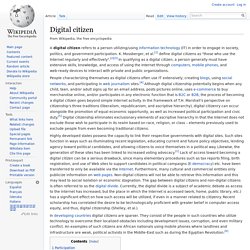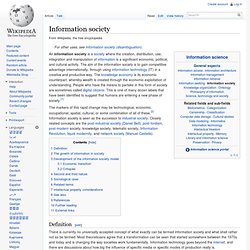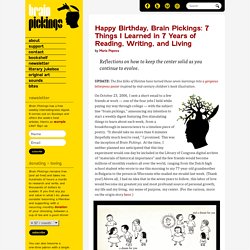

Digital citizen. A digital citizen refers to a person utilizing/using information technology (IT) in order to engage in society, politics, and government participation.

K. Mossberger, et al.[1] define digital citizens as "those who use the Internet regularly and effectively".[2][3] In qualifying as a digital citizen, a person generally must have extensive skills, knowledge, and access of using the Internet through computers, mobile phones, and web-ready devices to interact with private and public organizations. People characterizing themselves as digital citizens often use IT extensively, creating blogs, using social networks, and participating in web journalism sites.[4] Although digital citizenship potentially begins when any child, teen, and/or adult signs up for an email address, posts pictures online, uses e-commerce to buy merchandise online, and/or participates in any electronic function that is B2C or B2B, the process of becoming a digital citizen goes beyond simple Internet activity.
Netizen. Information society. An information society is a society where the creation, distribution, use, integration and manipulation of information is a significant economic, political, and cultural activity.

The aim of the information society is to gain competitive advantage internationally, through using information technology (IT) in a creative and productive way. The knowledge economy is its economic counterpart, whereby wealth is created through the economic exploitation of understanding. People who have the means to partake in this form of society are sometimes called digital citizens.
This is one of many dozen labels that have been identified to suggest that humans are entering a new phase of society.[1] The markers of this rapid change may be technological, economic, occupational, spatial, cultural, or some combination of all of these.[2] Information society is seen as the successor to industrial society. Definition[edit] The growth of information in society[edit] Economic transition[edit] Managing Monkeys. Memento.
50 Tricks to Get Things Done Faster, Better, and More Easily. Happy Birthday, Brain Pickings: 7 Things I Learned in 7 Years of Reading, Writing, and Living. By Maria Popova Reflections on how to keep the center solid as you continue to evolve.

UPDATE: The fine folks of Holstee have turned these seven learnings into a gorgeous letterpress poster inspired by mid-century children’s book illustration. On October 23, 2006, I sent a short email to a few friends at work — one of the four jobs I held while paying my way through college — with the subject line “brain pickings,” announcing my intention to start a weekly digest featuring five stimulating things to learn about each week, from a breakthrough in neuroscience to a timeless piece of poetry. “It should take no more than 4 minutes (hopefully much less) to read,” I promised. This was the inception of Brain Pickings. Illustration by Maurice Sendak from 'I'll Be You and You Be Me' by Ruth Krauss, 1954.
Illustration from 'Inside the Rainbow: Russian Children's Literature 1920-35.' Allow yourself the uncomfortable luxury of changing your mind. Donating = Loving Share on Tumblr. The Secret to Learning Anything: Albert Einstein’s Advice to His Son.